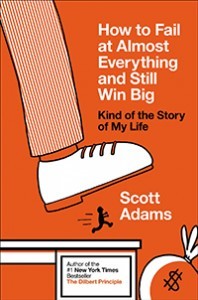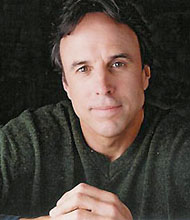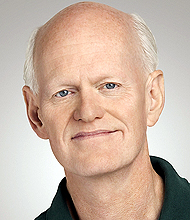| TRAVELS FROM |
|
SPEAKING FEE RANGE ** Please note that while this speaker’s specific speaking fee falls within the range posted above (for Continental U.S. based events), fees are subject to change. For current fee information or international event fees (which are generally 50-75% more than U.S based event fees), please contact us. $50,000 to $75,000 |
|
BOOK SCOTT ADAMS speakers@coreagency.com |
| TRAVELS FROM |
|
SPEAKING FEE RANGE* $50,000 to $75,000 |
|
Book Scott Adams speakers@coreagency.com |
- For more than 20 years, Scott Adams’ witty observations and satirical commentary about the push and pull of corporate life have made the Dilbert comic strip a mainstay with office workers worldwide.
- By redefining success as less important than the lessons learned from failure, Adams turns traditional business concepts upside down to increase the likelihood of success.
- Using humorous stories about his 36 business failures, Adams help audiences view their failures in a whole new light, while giving them a completely new template for success.
What started as a series of insulting doodles about co-workers and daily corporate drudgery, soon became the voice, vindication and comic relief for countless cubicle dwellers everywhere, catapulting cartoonist, author, humorist and speaker Scott Adams in to the forefront of national consciousness through his top-syndicated comic strip creation Dilbert.
Today, Dilbert appears in over 2,000 newspapers in over 60 countries and is translated into 19 languages. As an author, Scott Adams has numerous books in print, with more than 10 million sold, including several number-one New York Times best sellers. In 1997, he received cartooning’s highest honor, the Reuben Award.
As a popular keynote speaker, Scott Adams’ presentations revolve around Humor at Work, and his strange odyssey from cubicle to cartoonist, as well as some of the cartoons that didn’t make it past the editors and his secret formula for success.
Scott Adams’ jobs have included cow herder, sap gatherer, gardener, dishwasher, bus boy, hotel desk clerk, security guard, lab technical support, cartoonist, author, public speaker, and restaurateur. He held a variety of (in his own words) “humiliating and low paying jobs” during his eight years at Crocker National Bank and eight years at Pacific Bell. He has been a bank teller (robbed twice at gunpoint) computer programmer, financial analyst, product manager, commercial lender, budget manager, strategist, project manager, and pseudo-engineer.
The genesis of Dilbert came about during this time as Adams says he “entertained himself during boring meetings by drawing insulting cartoons of his co-workers and bosses.” Eventually the bespectacled character named “Dilbert” emerged from the doodles. In 1988, he mailed some sample comic strips featuring Dilbert to the major cartoon syndicates. United Feature Syndicate plucked Dilbert out of thousands of submissions received that year and offered him a contract. Dilbert launched in about 50 newspapers in 1989.
Adams continued his day job at Pacific Bell until 1995, drawing Dilbert at 5 a.m. every day before work. Now, he devotes his entire day (and much of the evening) to Dilbert, including speaking, writing, doing interviews and answering hundreds of email messages.
Adams was also co-executive producer of the Dilbert animated television show on the UPN network, a solid hit that ran for two years. Adams has guided the design of hundreds of licensed Dilbert products, from coffee mugs to dolls to computer games. Dilbert is one of the biggest character licensing phenomena of recent times.
Adams was born and raised in Windham, New York, in the Catskill Mountains. He has lived and worked in California since 1979. He holds a B.A. in Economics from Hartwick College, and an MBA from the University of California at Berkeley.
He is also a certified hypnotist.
Scott Adams may be one of the world’s most successful cartoonists, but he’s no stranger to failure. Along the way he’s learned an important secret: every failure brings important lessons that will help you on the road to success. Learn from Adams how to turn failures around to your advantage, managing your opportunities so it’ll be easier for success to come knocking.
Adams invites his audience on a hilarious journey through the corporate world, tracing his footsteps from cubicle dweller to award-winning cartoonist with characteristic wit. “Dilbert” springs to life as Adams shares tales from the trenches, complete with stories of strips that didn’t make it past the editors. Sprinkled throughout are Adams’ insightful tips for success.
In addition to crafting “Dilbert,” Adams is a gifted commentator on current business trends. He is happy to take questions from the audience at the end of his lively presentations.
How to Fail at Almost Everything and Still Win Big
Scott Adams says he’s failed at more things than probably anyone you know. In fact, he claims to have failed at more than 30 business ideas. Fortunately, one of his best ideas—the Dilbert comic strip—has become one of his most successful. So how did Adams turn his numerous failures into successes? How did he take what he learned, and instead of letting it defeat him, moved ahead? Just as Dilbert reflects much of Adams’ experience in the corporate world, Adams uses stories of his failures to give his audience a completely new template for success, turning three of the bedrocks of business—goals, passion and luck—on their heads.
Comedy, Cubicles and Corporate Life
The Dilbert comic strip has been called, "the best window into the reality of corporate life that I've ever seen," by Mike Hammer, co-author of Reengineering the Corporation. Chances are you have one or two of the side-splitting strips pinned up on your wall at work right now. With the scathing humor for which he's best known, Scott Adams takes audiences along on his long, strange journey from cubicle dweller to creator of Dilbert, the character with which hundreds of thousands of desk jockeys everywhere have groaningly identified. Adams jokes about the cartoons that didn't make it past the editors (rated PG) and his secret tips for success that you "won't hear anywhere else." Well-versed in the business issues of the day, he also takes questions from the audience.
Help Wanted: No Passion Needed
Scott Adams started his career like many workers – in a sea of cubicles, micromanaged and marginalized. After 16 years in the corporate world, he exchanged his mousepad for a sketchbook and became a full-time cartoonist. Although he took a risk to pursue his passion, Adams has a lot to say about passion and how it is not a pre-requisite for success. Adams loves to turn foundational business concepts upside down and demonstrate from his own life experiences how goals, passion and luck have little to do with success.
How to Fail at Almost Everything and Still Win Big
Scott Adams has likely failed at more things than anyone you’ve ever met or anyone you’ve even heard of. So how did he go from hapless office worker and serial failure to the creator of Dilbert, one of the world’s most famous syndicated comic strips, in just a few years? In this talk, Adams shares the strategy he has used since he was a teen to invite failure in, embrace it, then pick its pocket. He pulls back the covers on his own unusual life and shares how he turned one failure after another into something good and lasting. His keynote offers a lot of laughs alongside unique and helpful ideas for your path to personal victory. As Adams says, "This is a story of one person’s unlikely success within the context of scores of embarrassing failures. Was my eventual success primarily a result of talent, luck, hard work, or an accidental just-right balance of each? All I know for sure is that I pursued a conscious strategy of managing my opportunities in a way that would make it easier for luck to find me".
No career guide can offer advice that works for everyone. As Adams explains, your best bet is to study the ways of others who made it big and try to glean some tricks and strategies that make sense for you. Adams pulls back the covers on his own unusual life and shares how he turned one failure after another into something good and lasting.
Adams reveals that he’s failed at just about everything he’s tried, including his corporate career, his inventions, his investments, and his two restaurants. But there’s a lot to learn from his personal story, and a lot of humor along the way. Adams discovered some unlikely truths that helped to propel him forward. For instance:
- Goals are for losers. Systems are for winners.
- “Passion” is bull. What you need is personal energy.
- A combination of mediocre skills can make you surprisingly valuable.
- You can manage your odds in a way that makes you look lucky to others.
Adams hopes you can laugh at his failures while discovering some unique and helpful ideas on your own path to personal victory.

 VIDEO
VIDEO PROGRAMS
PROGRAMS BOOKS
BOOKS











































